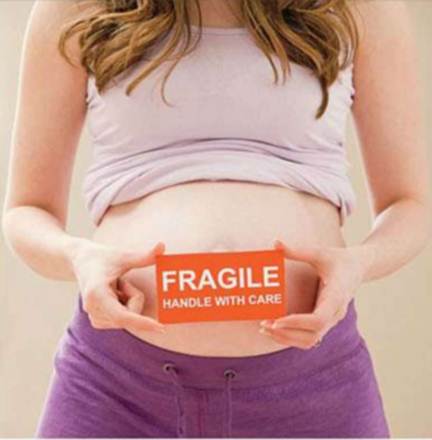Giving pregnant women the same
protections at work as disabled people might help save many jobs, but at what
price?
New York is the latest
State to consider a law that requires
employers to provide “reasonable accommodations” for pregnant workers as long
as doing so doesn’t unduly burden the company. If you’re shocked that pregnant
women don’t already have the right to minor, short-term changes in their duties
or work environments, such as using a footstool or avoiding heavy lifting,
you’re not alone. “It is unconscionable that, nearly 35 years after
passage of the Pregnancy Discrimination Act of 1978, women are still being
forced to leave jobs [and] being denied basic and reasonable accommodations
that would allow them to continue to work during pregnancy,” U.S. Rep. Jerrold
Nadler, D-N.Y., said in a statement earlier this year. To address this issue,
Nadler and 60 co-sponsors introduced the Pregnant Workers Fairness Act (PWFA)
in the House of Representatives in May.

Fragile
- Handle with Care
Pregnant women should already have such
protections under a 2008 amendment to the Americans with Disabilities Act
(ADA), says Jeannette Cox, a law professor at the University of Dayton in Ohio.
“The ADA now covers short-term situations that are quite comparable to
pregnancy, such as allowing a heavy-lifting restriction following back
surgery,” Cox says. However, many women bristle at the idea of characterizing
pregnancy as a disability. ‘“We are not disabled,’ is what we hear,” says New
York City attorney Dina Bakst, founder of A Better Balance: The Work and Family
Legal Center.
Know your rights
This reluctance has led to pregnant workers
having less legal standing than disabled workers with similar limitations, Cox
explains. If your pregnancy causes a “medically recognized impairment,” such as
gestational diabetes, your workplace rights are more secure, she says: “If you
can get a doctor to put a label on you, you should be covered under the ADA.”
But you may not be covered if, for example, you request more frequent bathroom
breaks or a transfer to less hazardous duty.

Is
Pregnancy A Disability?
The Equal Employment Opportunity Commission
(EEOC) recently held a hearing on the persistence of pregnancy discrimination
and may issue new guidelines to employers. “But there’s still no guarantee that
all pregnant women can get what they need to stay healthy and on the job under
existing law as it’s been interpreted by the courts,” Bakst says.